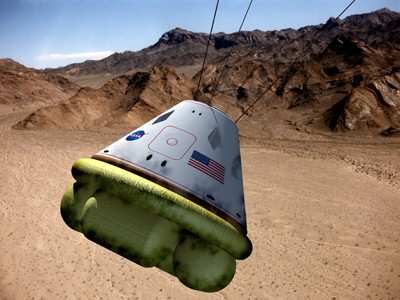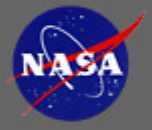Fri, Apr 13, 2007
CEV Will Be Able To Land On Land, Or Water
NASA's next manned spacecraft, the Orion, will parachute to the
ground in the western United States at the end of its missions,
much as Russia's Soyuz space capsules (and China's similar Shenzhou
capsules) do today. Orion, however, will also have the ability to
land in the ocean in the case of a launch failure, similar to the
landings used during the Mercury, Gemini and Apollo missions... and
that's an area many NASA engineers aren't as familiar
with as they'd like to be.

To address the issue, NASA states its engineers (many of which
were only children during the time of Apollo... or hadn't been born
yet) are working with the military squadrons that will be
responsible for rescue operations, as well as reaching out to
veterans from the Apollo moon-landing project... to learn
everything they can about capsule recovery operations.
"We want to get off on the right foot and make sure we're going
to head down the right path. We want to learn from history and push
forward and take it to the next level," said Brig. Gen. Susan
Helms, commander of the Air Force's 45th Space Wing, which
coordinates Department of Defense emergency support for US human
spaceflight missions.
NASA and the Air Force are calling on the veterans from the
Apollo program to advise those planning Orion recovery operations.
The first in a series of meetings occurred at Patrick Air Force
Base in Florida earlier this month.
 One example of the benefits of such experience comes from the
earliest days of NASA's manned missions. On the first two Mercury
flights, helicopters simply dropped a cable to the bobbing
spacecraft, and then lifted it out of the ocean and placed it on
the deck of an awaiting ship. This practice changed when NASA's
Liberty Bell 7 spacecraft sank, when the hatch inadvertently
jettisoned after splashdown with astronaut Gus Grissom aboard.
One example of the benefits of such experience comes from the
earliest days of NASA's manned missions. On the first two Mercury
flights, helicopters simply dropped a cable to the bobbing
spacecraft, and then lifted it out of the ocean and placed it on
the deck of an awaiting ship. This practice changed when NASA's
Liberty Bell 7 spacecraft sank, when the hatch inadvertently
jettisoned after splashdown with astronaut Gus Grissom aboard.
After that incident, NASA began equipping its spacecrafts with
floatation collars. The collars kept the craft afloat and provided
a platform for recovery and rescue divers. The added buoyancy
enabled the floating craft to come alongside ships, where cranes
lifted them onto decks.
More News
Inversion to Launch Reentry Vehicle Demonstrator Aboard SpaceX Falcon 9 This fall, the aerospace startup Inversion is set to launch its Ray reentry demonstrator capsule aboard Spac>[...]
"We are excited to accelerate the adoption of electric aviation technology and further our journey towards a sustainable future. The agreement with magniX underscores our commitmen>[...]
"The journey to this achievement started nearly a decade ago when a freshly commissioned Gentry, driven by a fascination with new technologies and a desire to contribute significan>[...]
Aero Linx: OX5 Aviation Pioneers Each year a national reunion of OX5 Aviation Pioneers is hosted by one of the Wings in the organization. The reunions attract much attention as man>[...]
"Our driven and innovative team of military and civilian Airmen delivers combat power daily, ensuring our nation is ready today and tomorrow." Source: General Duke Richardson, AFMC>[...]
 SpaceX to Launch Inversion RAY Reentry Vehicle in Fall
SpaceX to Launch Inversion RAY Reentry Vehicle in Fall Aero-News: Quote of the Day (04.23.24)
Aero-News: Quote of the Day (04.23.24) Aero-News: Quote of the Day (04.20.24)
Aero-News: Quote of the Day (04.20.24) ANN's Daily Aero-Linx (04.20.24)
ANN's Daily Aero-Linx (04.20.24) Aero-News: Quote of the Day (04.21.24)
Aero-News: Quote of the Day (04.21.24)




